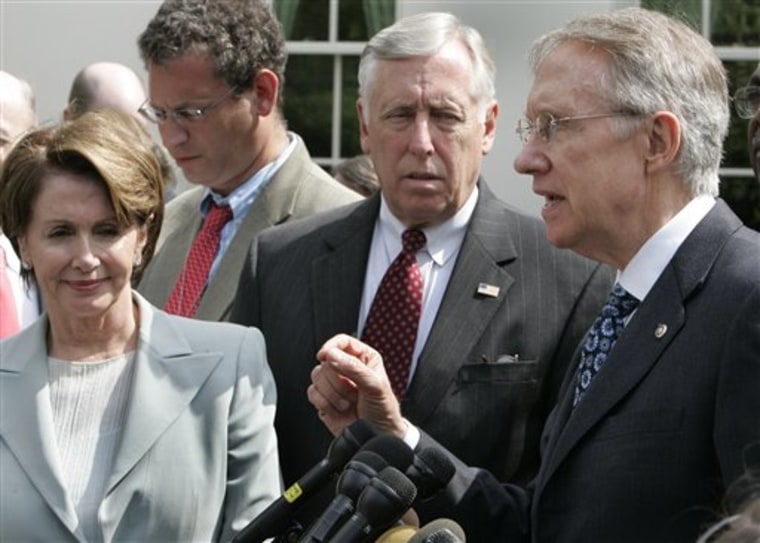Lawmakers divided over whether to keep U.S. troops in Iraq are finding common ground on at least one topic: They are furious that Iraqi politicians are considering a lengthy break this summer.
"If they go off on vacation for two months while our troops fight - that would be the outrage of outrages," said Rep. Chris Shays, R-Conn.
The Iraq parliament's recess, starting this July, would likely come without Baghdad politicians reaching agreements considered key to easing sectarian tensions. Examples include regulating distribution of the country's oil wealth and reversing measures that have excluded many Sunnis from jobs and government positions because of Baath party membership.
Compromise funding efforts
Talk of the adjournment comes amid a heated debate in Congress on the pullout of U.S. troops in Iraq.
President Bush this week vetoed $124.2 billion legislation ordering troops to begin leaving Oct. 1. Failing on Wednesday to gain a two-thirds majority needed to override the veto, Democrats were expected to begin negotiations Thursday with top White House aides on the next step.
Numerous possible compromises are being floated on Capitol Hill, all involving some combination of benchmarks. The key impasse, however, is whether to require redeployments of U.S. troops if the benchmarks are not met.
Democrats contend that initiating troop withdrawals will pressure Iraqis into making the necessary political compromises. Republicans say the Iraqis could still refuse to work together and the consequence would be a blood bath.
The only area of agreement between the two sides is that the Iraqis are testing their patience.
"That is not acceptable," Sen. John Warner, R-Va., said of a two-month recess. "An action of that consequence would send a very bad signal to the world that they don't have the resolve that matches the resolve of the brave troops that are fighting in the battle today."
Added Sen. Ben Nelson, D-Neb: "I certainly hope they're not going to take any sort of recess when the question is whether they're going to make any progress."
Republicans and Democrats themselves remain gridlocked on how far to go to force Bush's hand on the war. When asked about progress made on bipartisan cooperation in Congress, House Majority Leader Steny Hoyer, D-Md., declared to reporters Wednesday there had been "discussions about talking" but nothing more.
Recesses and violence
Congress leaves for four weeks each August and takes a week off, sometimes more, around prominent holidays. Lawmakers frequently adjourn for the August recess without reaching agreements on important legislation.
However, sectarian violence continues to rage in Iraq. In one particularly devastating attack, a bomb struck the Sadriyah market last month, killing more than 120 people and wounding more than 140 more.
More than 3,350 U.S. troops have died in Iraq. April was the deadliest month for the military this year.
The violence in Iraq and lack of structure in the new government are partly to blame for the slow political progress. For example, getting a quorum among Iraqi politicians can be difficult because a number of top Sunni legislators do not spend much time in Baghdad due to security reasons. Parliament leaders are also still struggling to impose party discipline among their rank-and-file members.
The Iraqis have been able to reach consensus in some areas, but not necessarily ones that would calm sectarian violence.
On Monday - the same day Rep. Ike Skelton, D-Mo., issued a statement urging the Iraqi politicians to reconsider their summer break - the Iraqi parliament called for a ban on U.S. troops near a holy Shiite Muslim shrine. Protests were led by the radical anti-U.S. Shiite cleric Muqtada al-Sadr's bloc after U.S. and Iraqi troops conducted a raid near the shrine.
